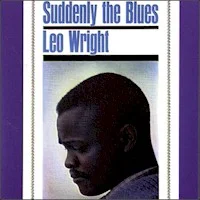Time: 34:06
Size: 78.1 MB
Styles: Bop, Saxophone jazz
Year: 1962/2006
Art: Front
[2:36] 1. A Felicidad (Happiness)
[2:44] 2. Greensleeves
[4:10] 3. Gensel's Message
[2:54] 4. The Wiggler
[4:42] 5. Tali
[3:07] 6. Dionysos
[4:24] 7. Sassy Lady
[4:22] 8. Willow Weep For Me
[5:04] 9. Suddenly The Blues
Leo Wright (saxophone), Kenny Burrell (guitar), Ron Carter (bass), Rudy Collins (drums),
Leo Nash Wright was born on December 14, 1933 in Wichita Falls, Texas. He took up the saxophone in the early 1940s under the tutelage of his father Mel, who taught him, “Don’t forget what came before.” He was influenced early on by blues greats Louis Jordan and fellow Texan Eddie “Cleanhead” Vinson. As Wright told one reporter, “People in the South know the blues.” His first alto idol, however, was Johnny Hodges whom Wright called the “father of the alto saxophone.” It was also inevitable that a young altoist in the fifties would fall under the spell of Charlie Parker. “Whatever Bird was doing, in all his music,” Wright said of his predecessor, “he retained the idea of the blues.” Wright could never have imagined that just a few years out of college he would play Bird’s former role as the foil to Dizzy Gillespie.
Drafted into the army in 1956, Wright began what would eventually be a long relationship with Europe. While stationed in Stuttgart, Germany, he played in a variety of bands that included Eddie Harris, Cedar Walton, Don Ellis, and Houston Person—young musicians, like Wright, ready to break onto the American jazz scene when they returned.
After a brief stint with Charles Mingus, which included an appearance at the 1959 Newport Festival, Wright joined company with Dizzy Gillespie, in whose band he would play for the next three years. Whatever he might have learned in college, Wright attended finishing school during his three years with Diz. “Dizzy is a giant,” Wright said at the time. “And when you’re working with the giants, you’ve got to improve. . . . You’ve got to learn discipline, get down to business. I’m still in school.” It was at the University of Dizzy that Wright’s playing gained its full range. The expanding world musical consciousness of his leader and their globe spanning travels added to Wright’s bop and blues vocabulary the musical idioms of Latin America, the Near East, and Africa.
Leo Nash Wright was born on December 14, 1933 in Wichita Falls, Texas. He took up the saxophone in the early 1940s under the tutelage of his father Mel, who taught him, “Don’t forget what came before.” He was influenced early on by blues greats Louis Jordan and fellow Texan Eddie “Cleanhead” Vinson. As Wright told one reporter, “People in the South know the blues.” His first alto idol, however, was Johnny Hodges whom Wright called the “father of the alto saxophone.” It was also inevitable that a young altoist in the fifties would fall under the spell of Charlie Parker. “Whatever Bird was doing, in all his music,” Wright said of his predecessor, “he retained the idea of the blues.” Wright could never have imagined that just a few years out of college he would play Bird’s former role as the foil to Dizzy Gillespie.
Drafted into the army in 1956, Wright began what would eventually be a long relationship with Europe. While stationed in Stuttgart, Germany, he played in a variety of bands that included Eddie Harris, Cedar Walton, Don Ellis, and Houston Person—young musicians, like Wright, ready to break onto the American jazz scene when they returned.
After a brief stint with Charles Mingus, which included an appearance at the 1959 Newport Festival, Wright joined company with Dizzy Gillespie, in whose band he would play for the next three years. Whatever he might have learned in college, Wright attended finishing school during his three years with Diz. “Dizzy is a giant,” Wright said at the time. “And when you’re working with the giants, you’ve got to improve. . . . You’ve got to learn discipline, get down to business. I’m still in school.” It was at the University of Dizzy that Wright’s playing gained its full range. The expanding world musical consciousness of his leader and their globe spanning travels added to Wright’s bop and blues vocabulary the musical idioms of Latin America, the Near East, and Africa.
Suddenly The Blues mc
Suddenly The Blues zippy





